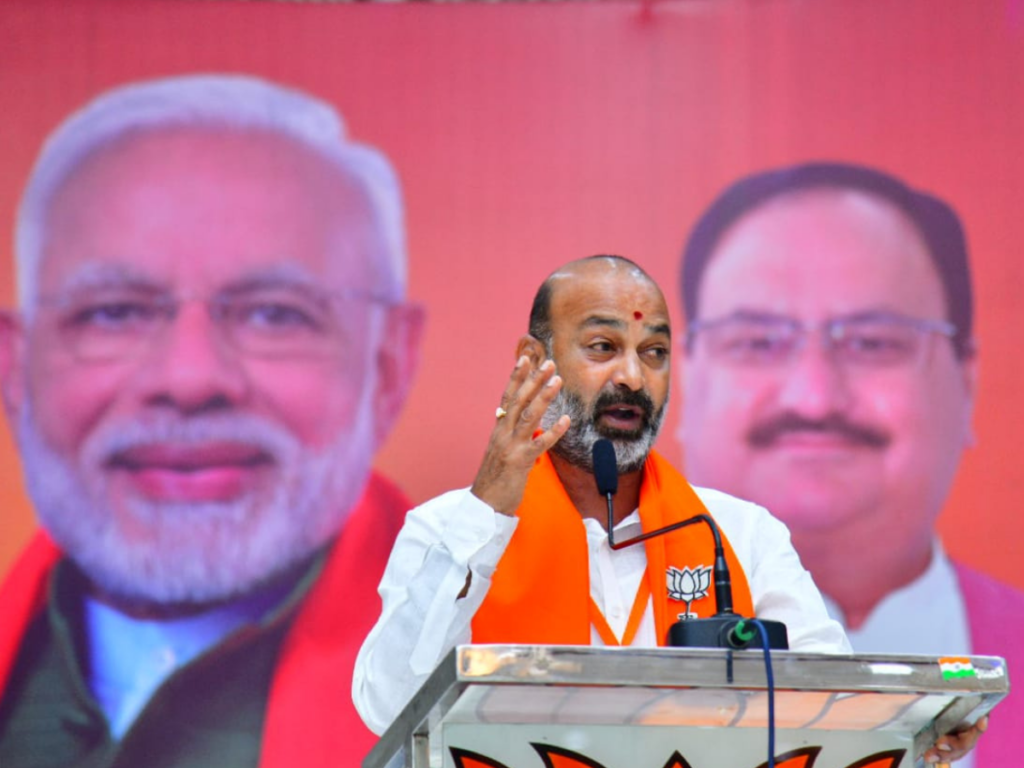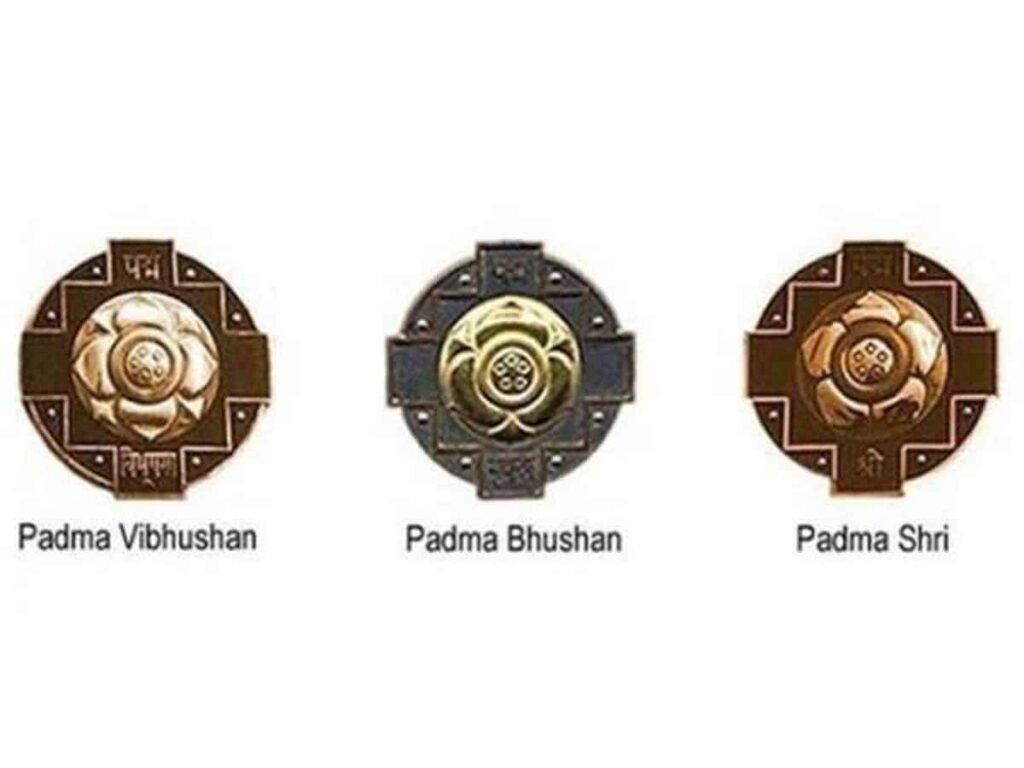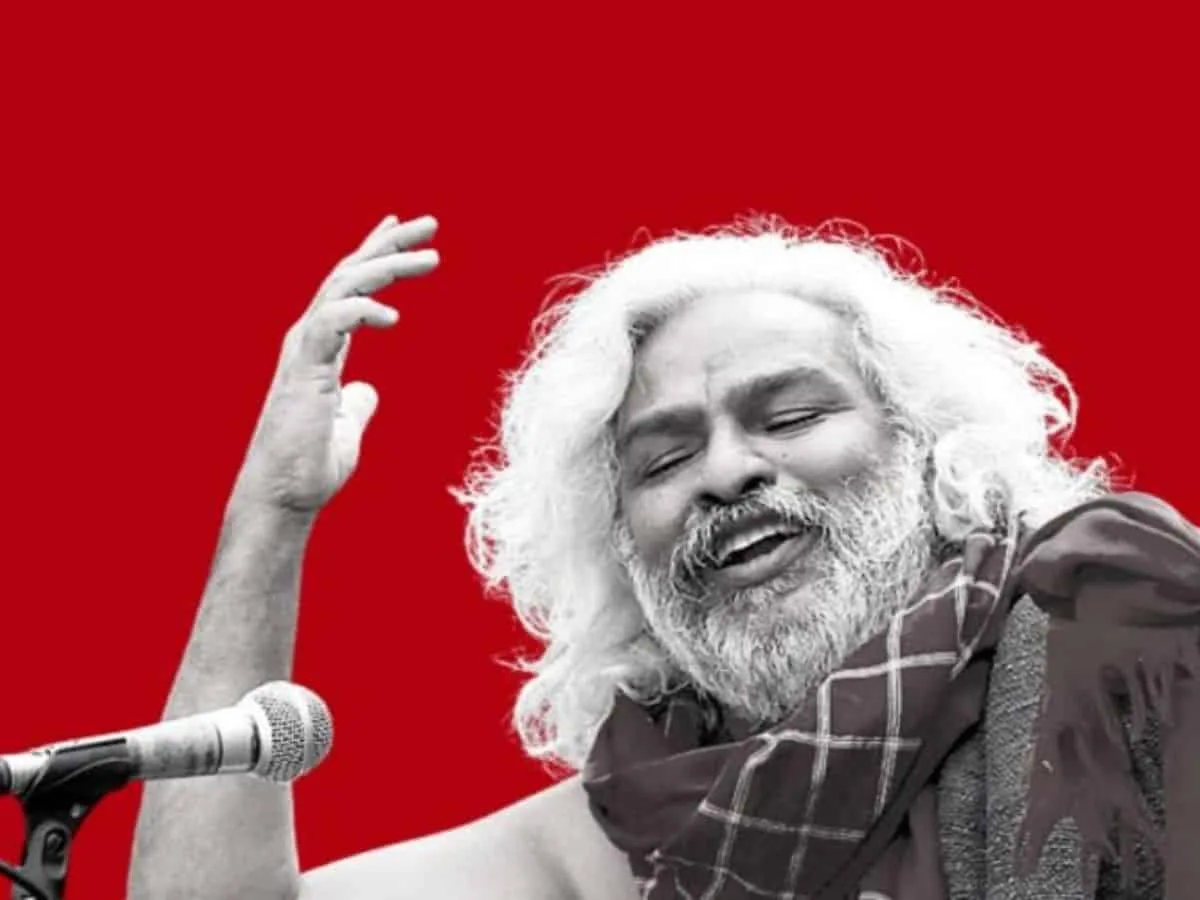Hyderabad: Union minister of state and Telangana Bharatiya Janata Party (BJP) leader Bandi Sanjay backed the Centre’s decision to overlook the state’s nomination for Padma Vibhushan for Telugu Revolutionary poet Gaddar, accusing the legendary poet of orchesterating the murders of BJP activists and police officials.
Bandi Sanjay’s remarks followed the chief minister’s statement expressing disappointment over the Central government disregarding the state’s recommendations over this year’s Padma awards. A reporter’s question on the state’s nomination, prompted Bandi’s remars against the activist.
“Why should Gaddar be given (Padma Awards)? He partnered with those who murdered BJP activists. He partnered with those who encountered many policemen..Gaddar was a close ally of the Naxals, why would he be considered for awards?” Bandi Sanjay asked.

Bandi further added that the state government should have been more careful while filing the nominations. “Everything will be considered. The (Telangana) government should have been careful while sending the names to the centre (for Padma Awards). I am not saying that the people who are named are not good enough, but it would have been considered if they were sent for Padma Sri,” he stated.

Telangana CM unhappy with Padma Awards
Telangana chief minister A Revanth Reddy reportedly expressed dissatisfaction regarding the Padma Awards 2025, stating that the central government insulted the people of Telangana by not considering the names of eminent personalities proposed by the state.
In a meeting with ministers, he highlighted that only two individuals from Telangana received awards out of the total 139 awardees: Dr D Nageshwar Reddy, who was awarded the Padma Vibhushan in medicine, and Manda Krishna Madiga, who received the Padma Shri for public affairs.
Padma Awards: Telangana CM unhappy with Centre for overlooking state’s proposals
The chief minister pointed out that prominent figures such as Balladeer Gaddar (nominated posthumously for Padma Vibhushan), renowned educationist Chukka Ramaiah (for Padma Bhushan), poet Andesri (for Padma Bhushan), poet Gorati Venkanna (for Padma Shri), and historian Jayadheer Tirumala Rao (for Padma Shri) were overlooked by the Central government.
He reportedly stated that this disregard for distinguished individuals who have significantly contributed to Telangana society is a violation of the self-respect of its people.
Who was Balladeer Gaddar?
Born into a Dalit family from Toopran in the Medak district of Telangana, Gummadi Vithal Rao, assumed the name ‘Gaddar’ from Gadar or revolt or rebellion. An engineering dropout of Osmania University, which was a ‘nursery for left movements and politics during 1960-80, he was influenced by the Maoist ideology and went underground.
His rich, baritone voice reverberated in the forests, and tribal areas, uplifting the spirits of the downtrodden and poor and drawing youth into the Naxalite movement, flowing with revolutionary ideas and songs for decades. With the Gongadi (black shawl or kambal of the Telangana Shepherd), tight dhoti and red scarf, and anklets to his feet, he was a sight to watch, full of energy and life during the performances.
Gaddar was a co-founder of the Jana Natya Mandali, the cultural outfit of the Maoists, which became popular in public fora. His songs and storytelling took a leaf out of the popular Burrakatha (the traditional storytelling form in rural areas). Many of his folk songs are best sellers with millions of CDs and recordings over the decades.
In 1990, when the then chief minister of combined Andhra Pradesh, Dr M Chenna Reddy lifted the ban on the PWG (People’s War Group), Gaddar’s Jana Natya Mandali organised a programme in the Nizam College grounds. Gaddar’s songs and performance which went on late into the night regaled and brought tears to the eyes of many in the record gathering of those times. Particularly, the lyrics on the martyrs of the Naxal movement which he composed as ‘Okkakaru Sukkallo Kalisipoyara Biddalu (each one of you has merged with the stars in the sky), recalled Durgam Ravinder, a Journalist, who knew Gaddar closely.
Movies, movements and politics
Gaddar has left an indelible mark in movies, stage performances, and people’s movements. But, his political ambitions failed to take off. In films, his big moment was the song–Bandenaka Bandikatti, voicing the struggles of the rural and land rights in ‘Maa Bhoomi’. It helped B Narsing Rao win the national award for an impactful movie. He played the role of the armed revolutionary, Yadagiri in the film and danced and sang the super hit song.
Similarly, his lyrics ‘Bhadram Koduko’ (Careful Man), demanding equality and justice in society from the film Rangula Kala is well-known. Among his famous songs are–Amma Telangana, Ooru Manadhira ((Village is Ours), Nee Paadham Meedha Puttu Macchanay Chellemma (Like a birthmark on your feet, my sister), the last one fetched him a Nandi Award, which he refused. These masterpieces not only ensured his place in cultural history but inspired a new genre of revolutionary folk songs and singers in Telangana.
Gaddar grew into a household name in both the Telugu states-Andhra Pradesh and Telangana, as far as raising the voice for the oppressed and disadvantaged sections of the people. However, his voice lent a huge strength to the separate Telangana movement. He penned the powerful lines—Podusthunna Poddu Meedha Nadusthunna Kaalama Poru Telangana–which became a calling song for the rallying of movements and agitations.
Gaddar experimented with politics, participated in civil movements, played an important part in the Telangana State formation agitation, etc. Along with the revolutionary writer of repute, Vara Vara Rao, Gaddar acted as the ‘mediators’ from the side of the Maoists in the peace talks with the State government in 2004 when Dr Y S Rajasekhara Reddy came to power.
But his political ambitions did not gain momentum. Though, he formed a party named Gaddar Praja Party, tried to seek support from all parties including Chandrababu Naidu to contest and in more recent times was veering close to the Cong(I), having met and shared the Dias with Rahul Gandhi too, the efforts were not taking off.
During the last decade of his life, Gaddar started shedding layers of the hardcore revolutionary that he was. His visibility in public fora, civil society activities, and politics grew. However, his movements slowed down as the 1997 attack on his life had left one bullet still lodged in his body. He travelled to several states singing and speaking on issues of the poor and downtrodden.







